
 |
|
|
#1 |
|
Member
Join Date: Jul 2012
Location: Mother North
Posts: 189
|
Hi guys,
I'd like to share one of my new favorites with you: A pakayun saber from the Murut people of North Borneo. The blade is 78,5 cm along the edge and 97 cm including the hilt. Hilt is carved wood, with a brass collar of the long type and a guard of the circular form. Above the guard is a wrap of plaided rattan, bordered by three braided rattan rings, of which one, as you can see, is unfortunately missing. Interestingly, only the side of the hilt facing outwards when worn, is carved – the inner side is left plain and smooth. Also curious is the fact that the hilt doesn't have the two pegs typical of most pakayuns, but is instead drilled and fitted with tufts of human hair where the pegs usually are. Human hair is often found mounted on the scabbards of pakayuns, but it is the first time that I see it on a hilt like this. When i picked it up, I thought for sure, that the hair was a later addition, but after cleaning, I can see no traces of there ever being any pegs and I am now more inclined to believe that the sword was indeed born this way. The blade shape is of the type with a marked shoulder as well as a progressing flare towards the distal end, as opposed to the type where the edge and spine runs parallel throughout the length of the edge. As you can see the tip ends quite abruptly. The steel is piled in laminations of a rather rough manufacture and the blade is very meaty: The spine thickness at the guard is 12 mm, gradually slimming down to 2,5 mm at the point where the spine slants down towards the tip. This is certainly a very different beast from the other native Borneo swords. Where the forward-weighted parangs are more chopping-type weapons, the pakayun is clearly built for long slashing strokes and in hand it indeed feels like a formidable weapon! I would love to have seen live Muruts in action and their handling techniques with one of these. The condition you now see it in is post-cleaning and post etching. It was a bit of a mess when I received it and I will describe the process in a post somewhere down below. I found it in a small shop dealing mostly with European naval weapons, so everything was polished to a high shine – blade included. I like it much better now.  It did come with a sheath, or at least the remains of one, but it is almost obliterated at this point and merely of academical interest. I will also post the sheath below, once I have taken some pictures of it. Cheers guys and hope you like it, - Thor 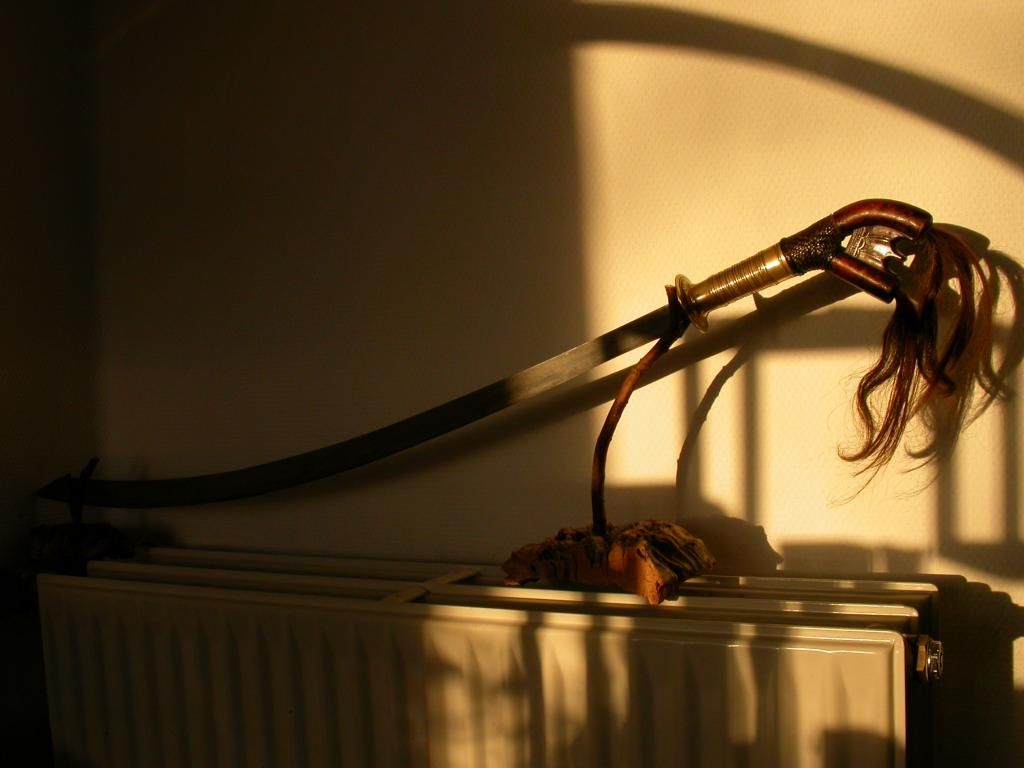 Carved outside of the hilt 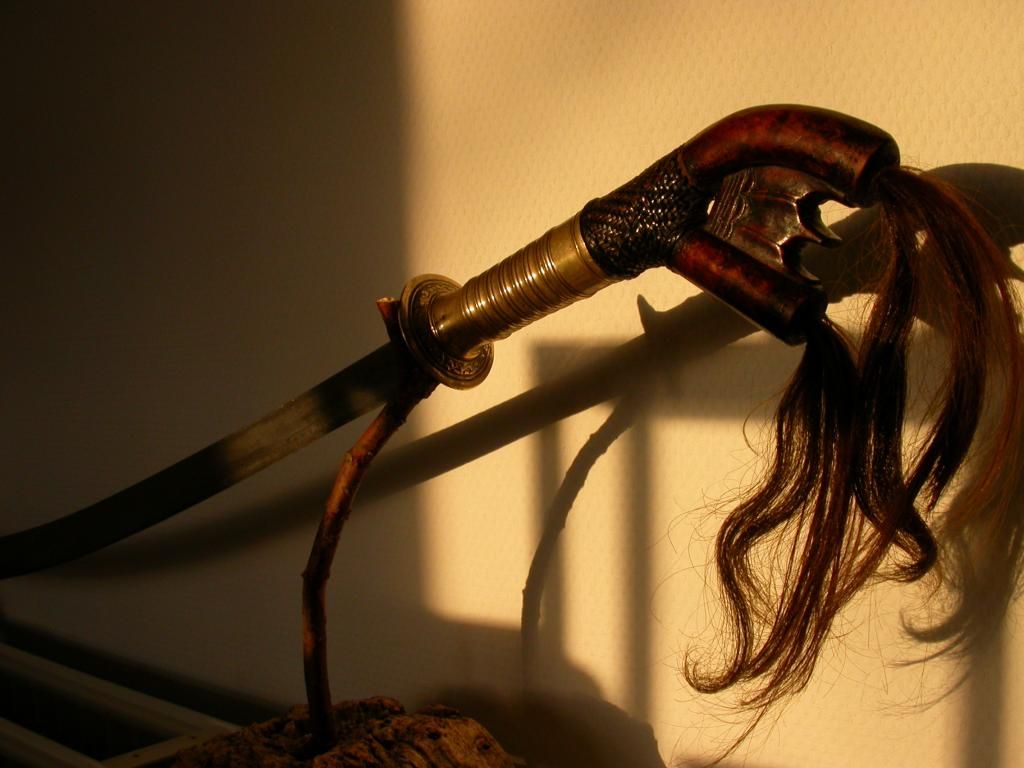 Uncarved inside of hilt - note blade shoulder 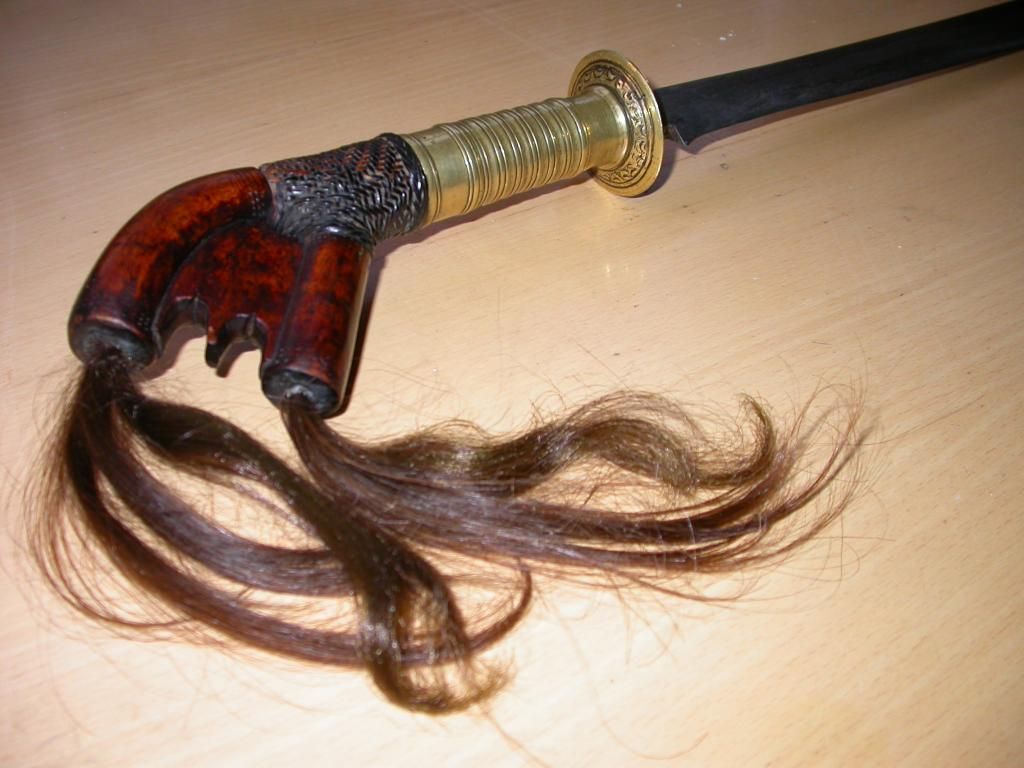 Two-tone rattan plaiding 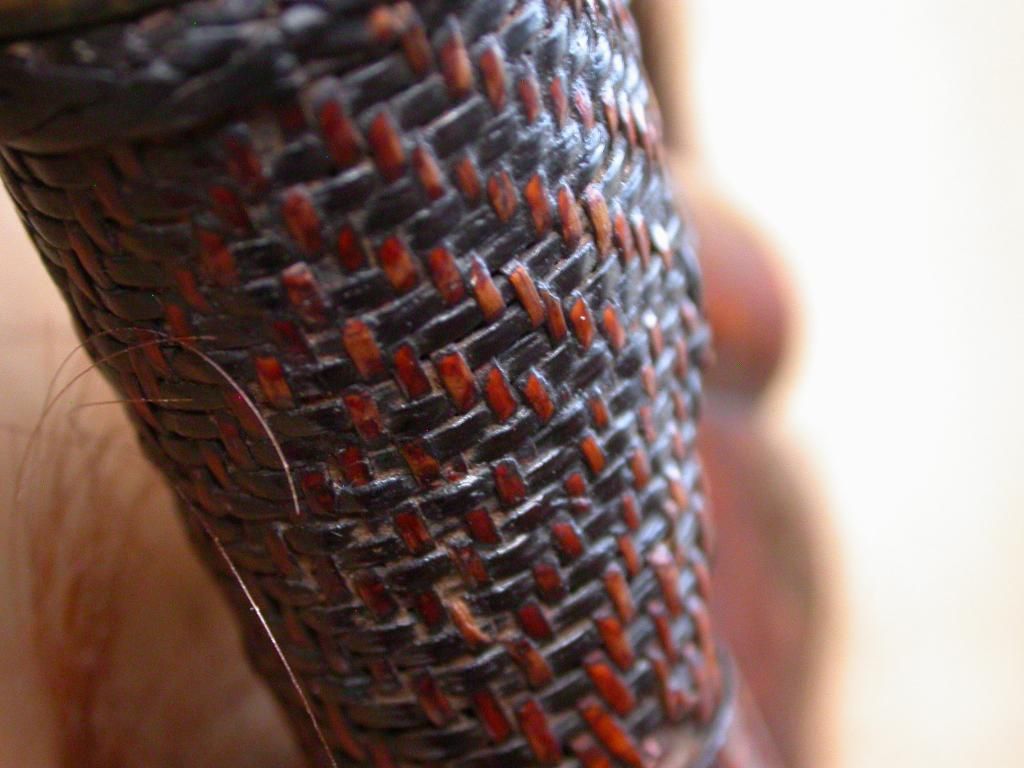 Laminated blade - note forging flaw in the blurry background 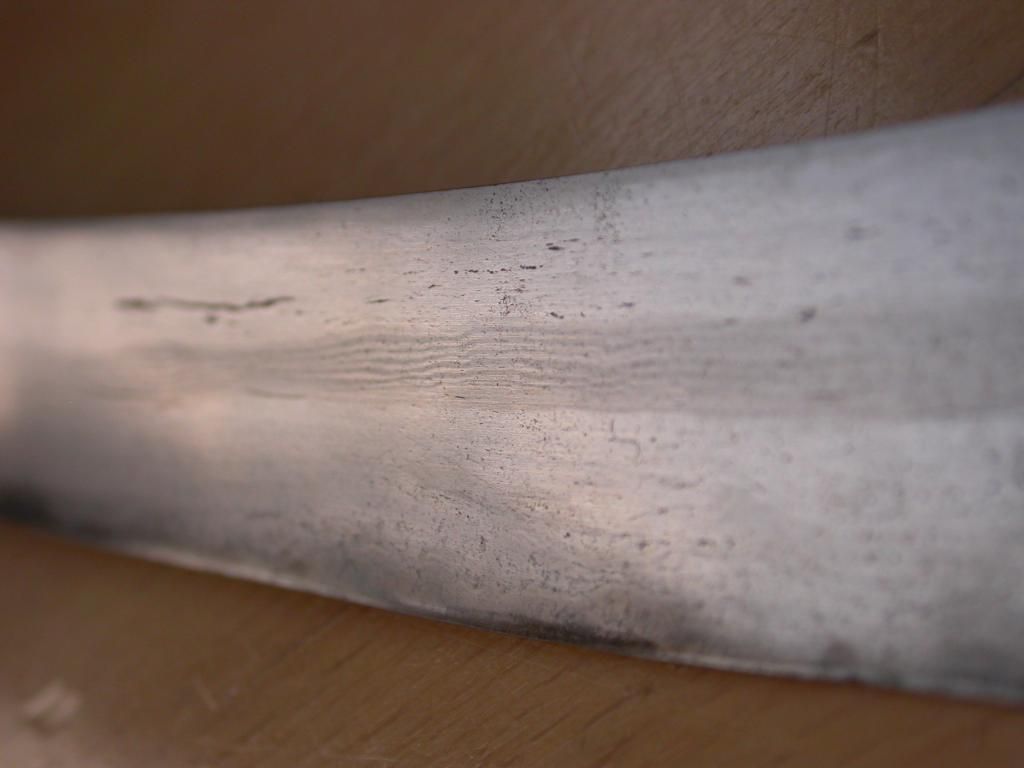 Laminated blade - here you can see the dark 'hamon' running along the edge 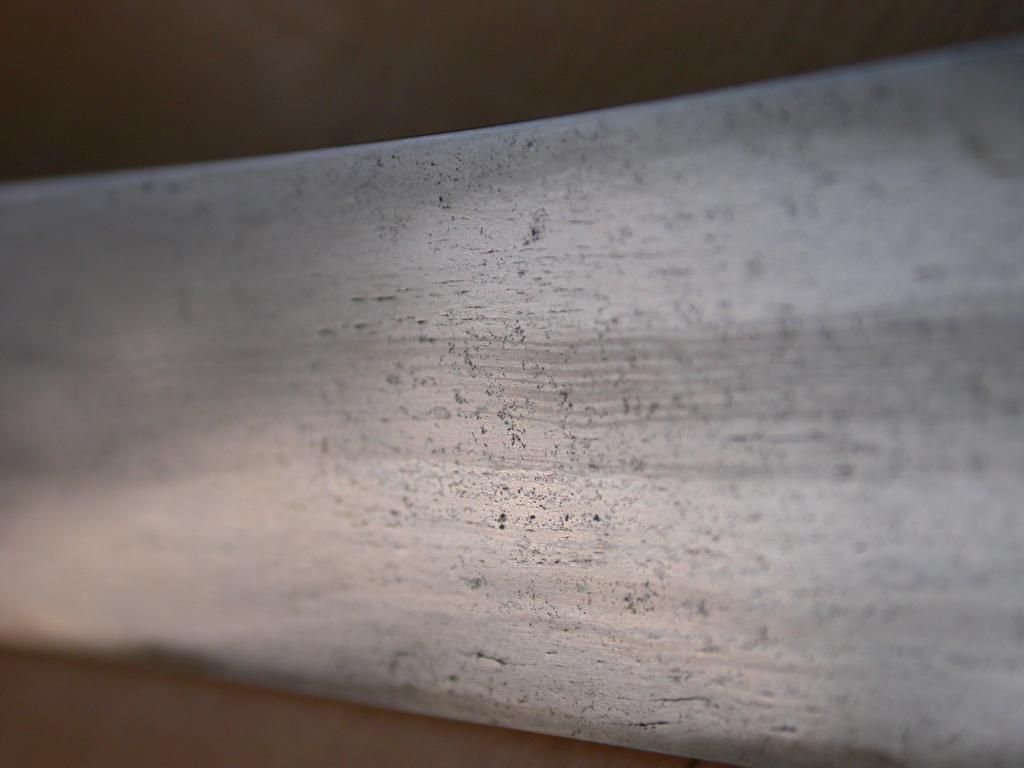 Whole blade from the tip end (sorry about the blur - the day ran out of light) 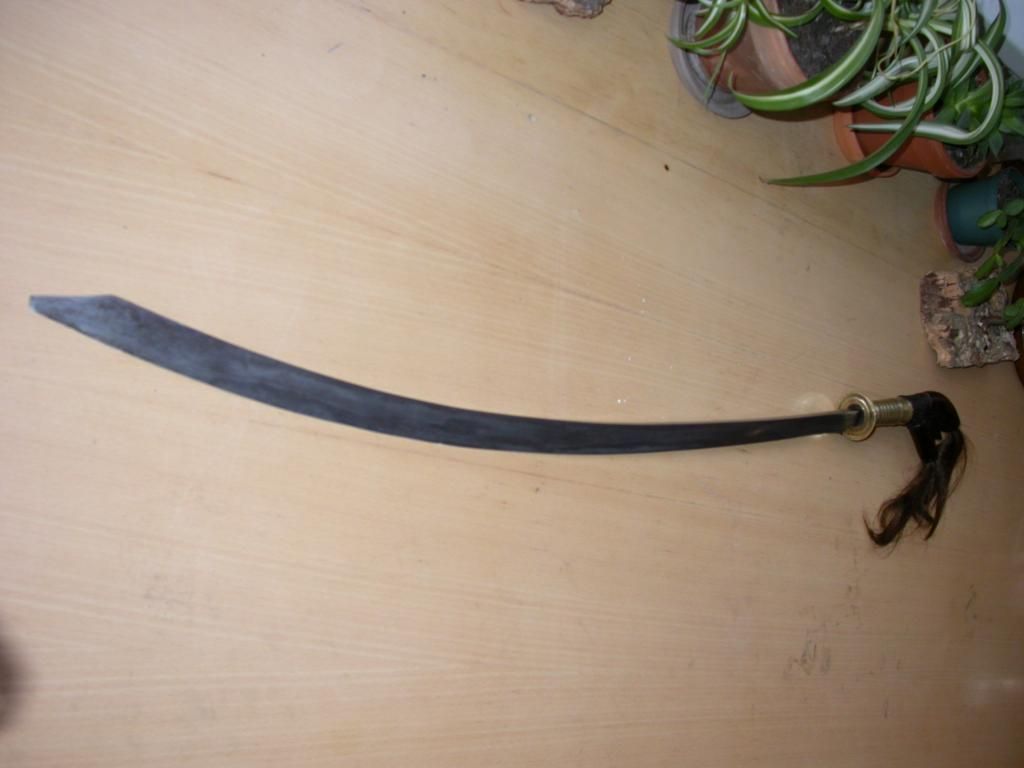
|
|
|

|
|
|
#2 |
|
Member
Join Date: Dec 2004
Location: Greenville, NC
Posts: 1,857
|
Gorgeous piece...magnificent superbly forged blade. I like the pommel too...so nice to see them with the rattan intact and complete. No scabbard??
|
|
|

|
|
|
#3 |
|
Member
Join Date: Aug 2007
Location: Germany, Dortmund
Posts: 8,788
|
Congrats, a very nice pakayun. The handle seems indeed original like this but I have to admit that I know not enough about this swords from the Murut people. The best expert about this swords is unfortunately not a member here anymore. But think that Michael, Maurice and Arjan can tell you more about yours. Here in the meanwhile some stuff to read and look.
http://www.vikingsword.com/vb/showth...hlight=pakayun http://www.vikingsword.com/vb/showth...hlight=pakayun http://www.vikingsword.com/vb/showth...hlight=pakayun Maybe I can add that it is an old type since the brass collar is long. Regards, Detlef |
|
|

|
|
|
#4 |
|
EAAF Staff
Join Date: Feb 2005
Location: Centerville, Kansas
Posts: 2,196
|
BEAUTIFUL !!!
 Robert |
|
|

|
|
|
#5 |
|
Member
Join Date: Dec 2004
Location: Sweden
Posts: 1,637
|
Nice find!
The only problem is that Murut weapons seem to be very addictive. I have seen one earlier with hair attached like yours but I can't find where I put the reference pictures. Unfortunately I never examined it in person. However, if you are positive it is original then it probably is (even if it is very rare for them to have the hair attached on the hilt). Michael |
|
|

|
|
|
#6 |
|
Member
Join Date: Jan 2007
Location: The Netherlands
Posts: 1,352
|
Nice pakayun Thor! Congratulations!
I've also have seen one very recently with hair attached to the handle like this as far as I can recall. But I do know that sometimes one or both "pegs" are broken off. My feeling is that it had pegs once though. But it could be a native "restoration" and they put hair into it when they broke off because one or another reason...? Concerning the scabbards: Most of the scabbards are broken, mostly at the tip where a pieces broke off. I think this was a very weak point in the scabbard as theres a curve upwards into the wood, and together with the grain of the wood it probably broke off with the least bumping... Do you have pictures of the scabbard? Nice sword and ratan in perfect condition!!! Best, Maurice |
|
|

|
|
|
#7 |
|
Member
Join Date: Jan 2008
Posts: 1,430
|
I like these swords - very nice indeed. Congratulations

|
|
|

|
|
|
#8 |
|
Member
Join Date: Jul 2012
Location: Mother North
Posts: 189
|
Thank you for your nice comments. I will get some pictures up of the scabbard, as soon as the lighting is fit. It's not a pretty sight, but at least we will have the carving up for future reference. It is indeed possible that the hilt once had pegs - if the transition from peg to hair was done careful enough, I guess it'd be impossible to tell so by now.
I've been through all the old Murut-related threads, both here and in the archives - this forum is a true treasury of knowledge!  When I got it, as I mentioned, everything was polished to a high shine. I took the blade through a series of sandpaper from grit 800 - 1000 and then steel wool. It then got a vinegar etch (my first time etching anything. wee!) and I finished off with more steel wool and a very light coating of WD40. The hilt was gently cleaned with lukewarm water and cotton-sticks. I then gave it a drop of linseed-oil and a soft-tissue rubbing. The hair was probably the most troublesome part to do: Most of it had tangled up into these sausage-like locks. Using a thin hardwood-pick and a lot of patience, I worked on it for 1½-2 hours a day over a week. Once untangled, I then gave it an application of dry-hair shampoo followed by a treatment of "damage-repair" conditioner and finally a coating of something called 'Moroccan Oil' - all btw, on the careful advice of my girlfriend.  The Moroccan oil, she explained is essentially just a coating of silicon that you leave in, making the hair feel softer and look more shiny. Plus my sword now now come with the most delightful smell of flowers!  This light restoration has really been an exciting process for me. Although no way near the magic we sometimes see, for instance, our friend Battara pull off, I feel it has been a journey full of learning. Just watching that pattern emerge during the etch made my jaw drop and I really feel I have done the sword right, in restoring it to it's full potential like this. - Thank you for all your coments guys!  All the best, - Thor |
|
|

|
|
|
#9 |
|
Member
Join Date: Feb 2012
Posts: 462
|
Super sword
congratulations |
|
|

|
|
|
#10 |
|
Member
Join Date: Jun 2008
Location: The Sharp end
Posts: 2,928
|
Hi Thor,
That's an extremely fine and unusual sword that you have found! Excellent in all respects, the complexity of the hilt construction, the laminations in the steel, the long tufts of hair.......  Although you tell us that the blade was polished when you acquired it, the patina of the hilt seems to have been preserved, fantastic! Your restoration is completely appropriate and of a professional level. Congratulations indeed. Gene |
|
|

|
|
|
#11 |
|
Member
Join Date: Dec 2004
Posts: 738
|
Very nice pakayun !! Very good adquisition !!1 is a very unusual sword !!
I have one similar, with one peg missing, and with hair in the scabbard. Congratulations carlos |
|
|

|
|
|
#12 |
|
Member
Join Date: Jul 2012
Location: Mother North
Posts: 189
|
Hi Carlos, and thanks for putting up a picture of your paka too! It looks great! I see yours is of the other type, where the spine and edge runs parallel until the tip and with no shoulder. How thick is the blade at the guard on this type? I'm very curious to know as I've never had the chance to handle any other paka than my own.
 I've finally had a bit of sunlight in my end of the world and so I managed to snap some photos of the scabbard and especially some closeups of the decorations, for future comparisons and forum reference. Here is the whole scabbard minus the part that is long gone. As you can maybe see, the sequence from throat to tip goes: carvings - tin band - drawing - tin band - carving - tin band - drawing//break. Considering the length, I suspect that then there had been another tin band, more carvings and then a final tin band at the end - like seen above in Carlos' complete piece. 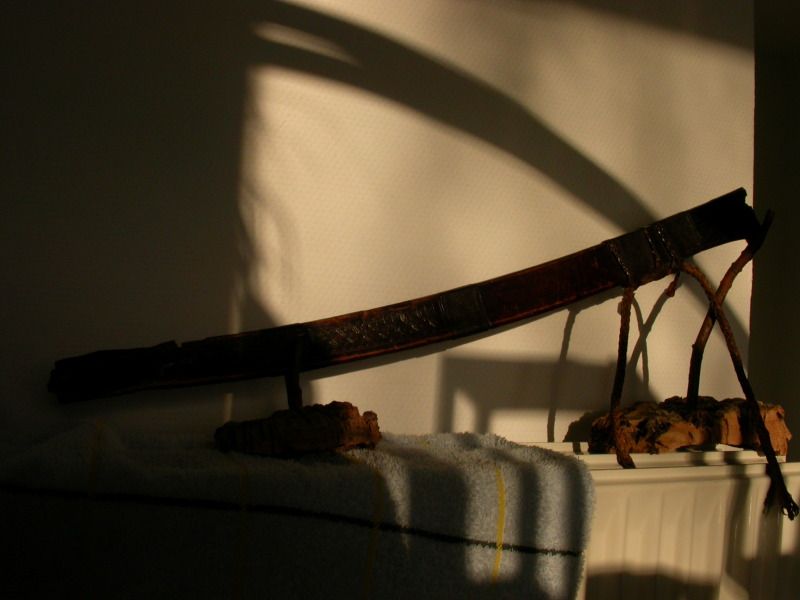 Here are the throat carvings - notice the cool little butterflies. 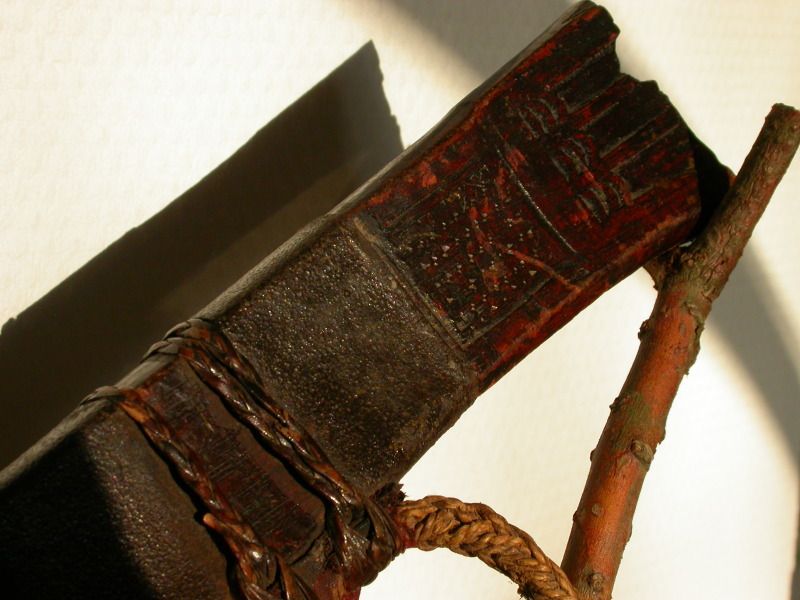 At the first tin band, the belt cord is attached. The cord material is not rattan, but something which feels similar to jute. The braid is round and the cord very flexible. What I really love though, is the tiny piece of dirty textile woven in under the rattan bindings. I can't help but wonder if some Murut sacrificed his handkerchief or a bit of his shirt, to get the fit just right. -and look, there are little flowers on it!  This little piece has for me led to a new love of and search for textiles on swords. This little piece has for me led to a new love of and search for textiles on swords.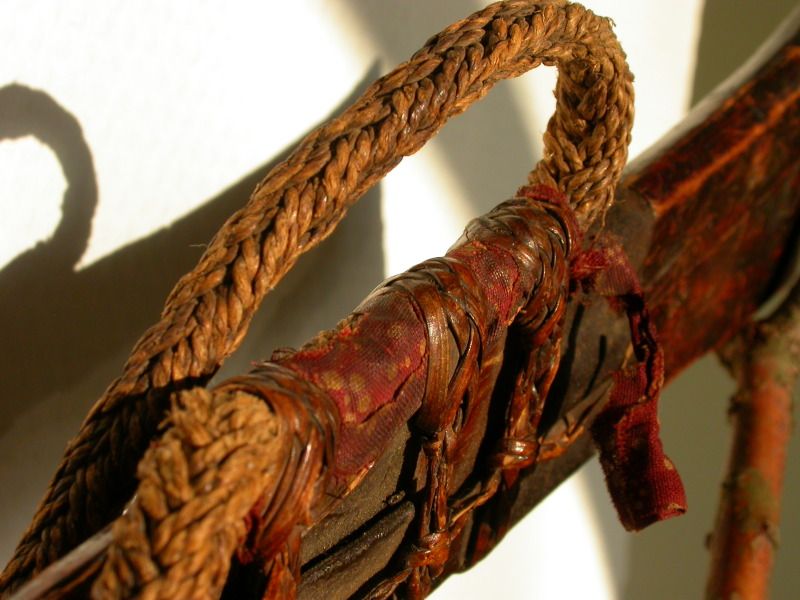 After the first tin band is a panel with these patterns. They seem to have ben drawn or somehow tattooed onto the wood, beneath the coat of lacquer/varnish. I'm wondering whether the coating was applied natively or by some collector back in the day. 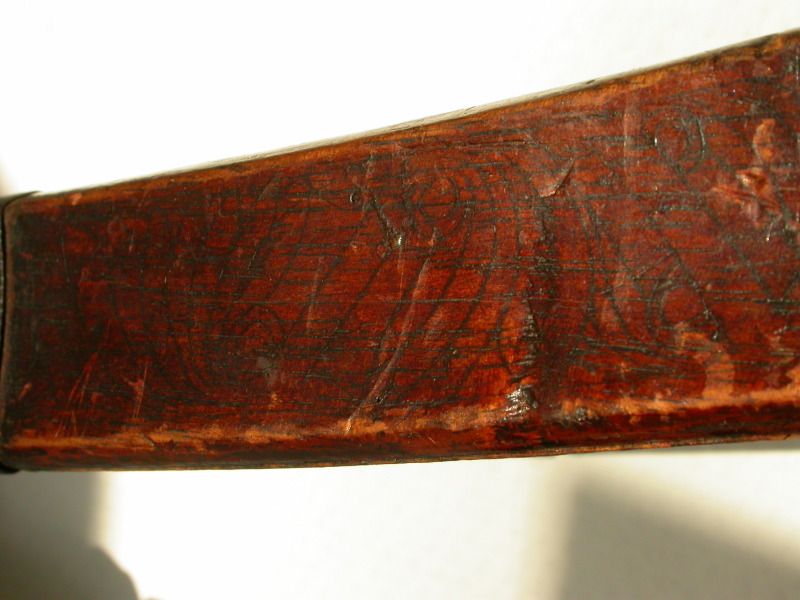 After the next tin band we have this panel of carvings. It is well worn now, but the beautifull patterns are still well visible. Very distinct and certainly different from the carved motifs of the Dayak. 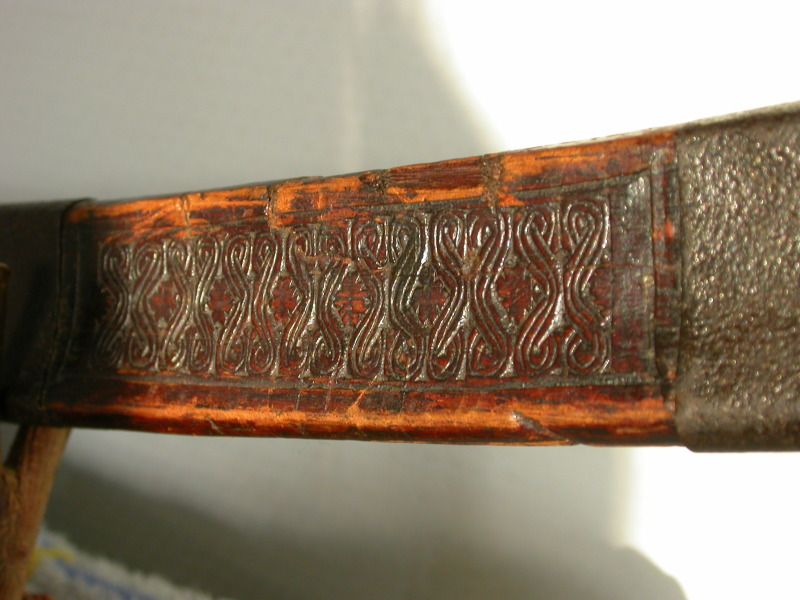 I haven't photographed the following and last panel, as it is decorated with similar drawings as the panel described above. These are also hardly visible, due to wear and the scabbard breaking here. I hope you all enjoyed the post guys. If anybody is sitting out there with pictures of your own pakayuns - please do post them up here!  Very best wishes, - Thor |
|
|

|
 |
|
|